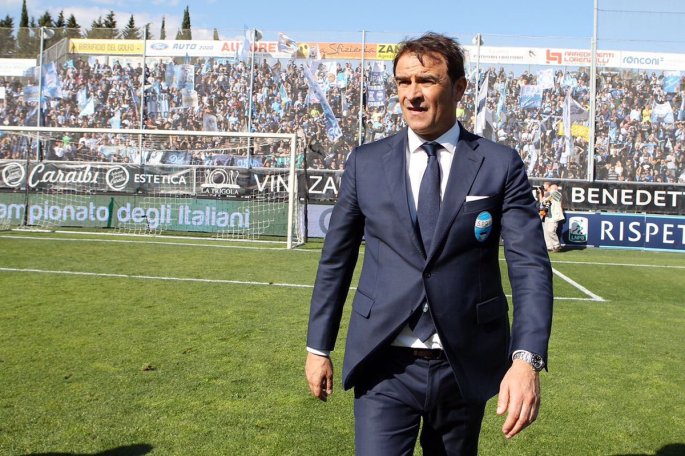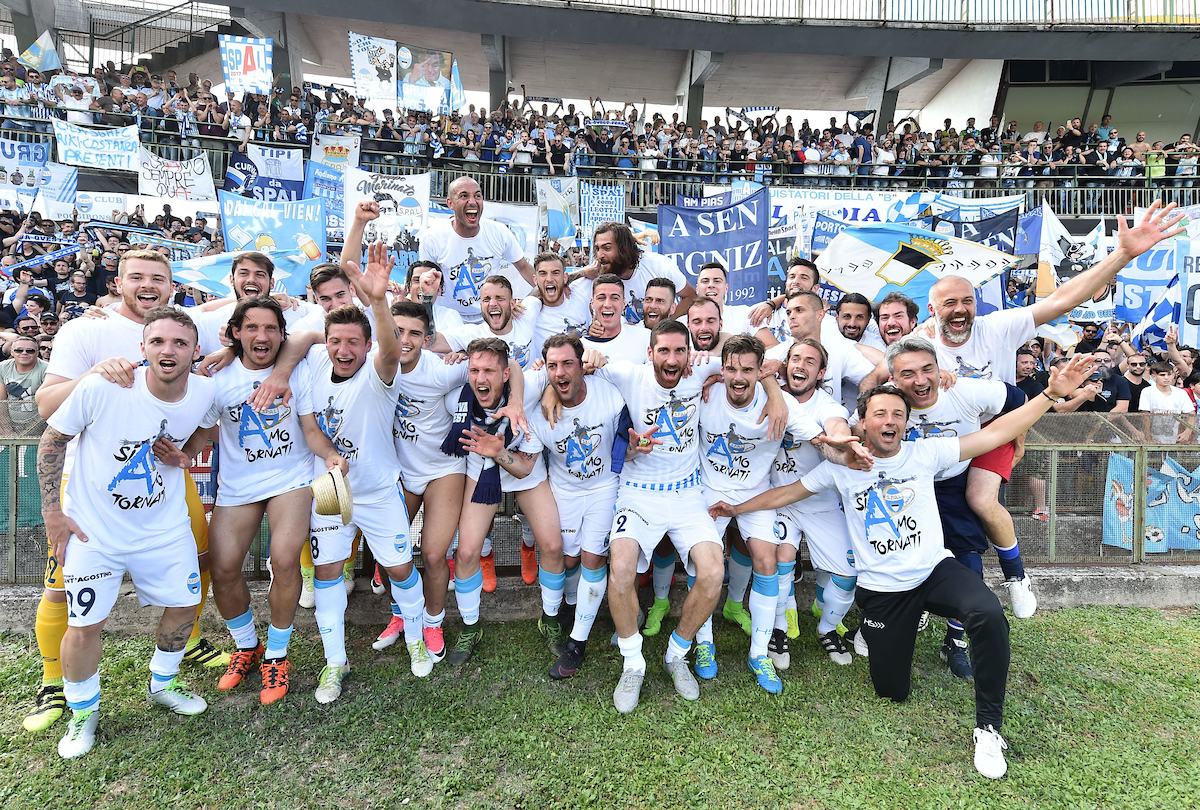“Nobody thought we could get to this point,” were the words of SPAL coach Leonardo Semplici after his side had confirmed their promotion to Serie A last season. “We have had an exceptional journey and done very well.”
Nobody did expect it, not even the most optimistic supporters of the modest Ferrara-based club. Only a year earlier, SPAL had earned promotion to Serie B for the first time in 23 years, only five years earlier they had played amateur football amid near bankruptcy and financial ruin.
Though few outside of Italy, and even some in the country, will be overly familiar with SPAL, or Societa Polisportiva Ars et Labor to give them their full title, they are a club with a fascinating history, and one that came close to a tragic and premature conclusion.
SPAL, despite their lowly reputation, are one of Italy’s oldest clubs, founded in 1907 by Salesian priests in a monastery. The first club of Fabio Capello, Edy Reja and Luigi Delneri, SPAL were a Serie A fixture in the 1950s and 60s, well-run and shrewdly managed. Astute president Paolo Mazza, who would later see the club’s stadium named in his honour, was largely responsible for the stability.
Before his untimely death in 1981, after which SPAL’s financial situation began to deteriorate, Mazza was an innovator and moderniser of the transfer market in Italy. The wily and eccentric president recruited young players who had previously struggled, discovering talent and offering those he saw potential in another opportunity. The likes of Edoardo Reja, Alberto Bigon and Luigi Delneri all benefitted from his influence.
As Mazza’s tenure came to a close, so too did the security and soundness of the club’s ownership. A prolonged period of neglectful management led to a decline on the pitch – relegation as far as the third tier – and increasing financial difficulty off it. Numerous economic crises led to SPAL being re-founded on several separate occasions, simply to avoid liquidation.
In 2012, SPAL reached their nadir. For the second time in their history, they were declared bankrupt, unable to pay their mounting debts. The club was officially dissolved, only to return as SPAL 2013 in Serie D, the fourth tier and amateur football. Surviving required help from neighbouring fourth division club Giacomense who, fortunately for SPAL, were headed by lifelong fan Walter Mattioli.
The tiny club from Masi Torello merged with SPAL, and in doing so instigated the beginnings of a remarkable revitalisation. For Mattioli it was a lifelong dream come true, albeit in somewhat unwanted circumstances. After 25 years at the helm of Giacomense, he was instated as SPAL president, and quickly set about introducing some much-needed stability.
He brought in former Giacomense player Davide Vagnati as sporting director, who worked alongside the president to improve matters on the pitch, while new owners, the Colombarini family, provided substantial financial investments. There was a competence and dependability at the top that had been severely lacking for years, but most importantly, passion and understanding.
“We swore to ourselves there will be no more financial problems, no more scandals, no more misery. Never again,” Mattioli said. And so far, there have not been. There has been only success, a meteoric rise to prominence from the obscurity of Calcio’s lower reaches.
It has not been a straightforward path back to Serie A for SPAL. The rapidity of their ascent from near destruction to Serie B champions may make it appear so, but it has required ingenuity and a collectively dogged determination to overachieve in such a manner. Budget constraints left little option but to assemble a squad entirely of Italian players which, although not entirely brought about by choice, soon became a point of pride for SPAL.
The club’s budget was dwarfed even by some second-tier sides last season, but few were as well organised and tactically assured as the minnows from the Emilia-Romagna region. Then there’s the coach, Semplici, plucked from the youth setup at Fiorentina. He arrived at SPAL in December 2014, when the club were struggling in the third division, finished that season strongly, and proceeded to lead his side to two successive promotions.
Semplici has compared himself to another Leonardo – not Da Vinci, although he has been at the forefront of a true footballing renaissance – but Jardim, manager of Monaco. SPAL’s football is fast-paced, attacking, but efficient, in a well-drilled 3-5-2 system that has been taken to by a group of players without egos, and very much a cohesive unit.

Mister Semplici has helped engineer Spal’s remarkable rise to Serie A
SPAL’s impressive rise has not been down to a sole individual, however. It has been very much a cumulative effort, one that has taken the combined endeavour of an expertly assembled group of players and staff. General manager Alessandro Adreini and head of recruitment Giacomo Laurino helped put together a squad with both experience and youth, most players arriving on free transfers or on loan.
Teenage goalkeeper Alex Meret excelled in the promotion campaign last season, becoming the first SPAL player since the early 1950s to play for the Italian national team. Then there were the superbly consistent performances of centre-back Kevin Bonifazi, 19, on loan from Torino, and winger Manuel Lazzari, who has been at the club since the merge with Giacomense.
They were accompanied by seasoned professionals such as Mirco Antenucci, the former Leeds striker whose 18 goals proved vital for the league winners, and 35-year-old Sergio Floccari, who also contributed with a number of goals following his arrival in January.
It remains to be seen how this frugally assembled squad will fare in Serie A, a division that represents a somewhat daunting step-up for a club now so unfamiliar with the biggest of stages. SPAL’s humble 8,500 capacity Stadio Paolo Maza was repeatedly filled as optimism and enthusiasm grew last season, and it’s likely that purchasing a ticket will prove even more difficult with the arrival of top flight football. Expectation, though, will be very much kept to a minimum.
“We will be playing against clubs with a bigger budget and more illustrious histories than ours but we are convinced our professional approach and passion will help us stay in the top flight,” Semplici has said. “Sometimes dreams come true.”
Certainly, there is no aim other than to survive for SPAL. Anything more miraculous would take this already astonishing story into the realms of disbelief. Still, there is an underlying confidence, helped by the proven sagacity of the club’s hierarchy and the continued brilliance of Semplici.
Keeping hold of the tactician is not likely to be easy, with reports of interest from Napoli as a potential future replacement for Maurizio Sarri, and rumours of a return to Fiorentina. He has, however, given no indication that he is anything but entirely focused on the job at hand.
“It is very satisfying on a personal level too,” Semplici said after promotion was achieved last season. “I started from the bottom and I am happy. I have trained men before anything else, then players.”
Semplici means ‘simple’ in Italian, and there is something beautifully uncomplicated, almost old-fashioned about the way SPAL have re-emerged and climbed expeditiously through the divisions to return to the top. But, as Leonardo Da Vinci once said, “simplicity is the ultimate sophistication”. Modest SPAL, resurrected by an impassioned president and led by an equally intelligent coach, now find themselves very much amongst the Italian footballing nobility.
Words by Callum Rice-Coates: @Callumrc96
Callum is a Senior writer for @thesefootytimes and Atletico Madrid correspondent for @90min_football<.

